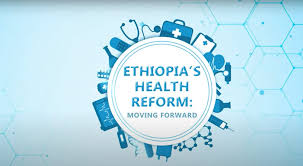Ethiopia’s Health Reform: Moving Forward - ENA English
Ethiopia’s Health Reform: Moving Forward

Addis Ababa, June 14, 2025 (ENA)—Over the past six years, Ethiopia has made substantial strides in comprehensive reforms aimed at accelerating national development through modernized public services, stronger institutions, and improved quality of life.
At the heart of these reforms is the health sector, recognized as a top national priority.
The country is actively implementing the National Health Extension Program Optimization Roadmap to advance Universal Health Coverage by expanding access to essential health services, including prevention, health promotion, treatment, rehabilitation, and palliative care.
At the core of this reform is a shift from treating illness to preventing it. The Ethiopian government has placed strong emphasis on disease prevention, community health education, and early intervention.
This focus has led to major expansions in vaccination campaigns, public health awareness, and sanitation efforts.
As a result, Ethiopia’s immunization coverage has grown significantly, with vaccines for polio, measles, and COVID-19 reaching more children across the country.
In the past six years, vaccination rates have risen, safeguarding millions from life-threatening diseases.
Although vaccine hesitancy persists, ongoing community outreach and education efforts have played a key role in increasing public acceptance.
To meet the growing demands, the government has invested heavily in health infrastructures including building new hospitals, clinics, and health posts across urban and rural areas.
These facilities are increasingly staffed by trained professionals, thanks to capacity-building programs and expanded medical education.
The expansion of health services is bringing care closer to people's homes. Rural areas, once underserved, now benefit from more health posts and mobile clinics.
These mobile units reach remote communities where access to hospitals is limited, helping save lives and significantly improve the health of thousands.
Currently, 82 percent of Ethiopia’s population receives care through government health facilities. To reduce dependence on treatment abroad, the government is actively constructing specialized referral hospitals across the country.
Ethiopia’s healthcare system has made significant progress in expanding access, strengthening the skills of health professionals, and ensuring equitable distribution of medical supplies.
Ethiopia's health workforce has seen significant growth over the past six years, with more training programs established for doctors, nurses, and health workers.
The government has also focused on retaining health staff in rural and underserved areas, leading to improved staffing and service quality in rural clinics.
Community health workers have emerged as vital contributors in providing basic care, health education, and disease prevention.
These successful initiatives have resulted in notable progress in safeguarding mothers and children, with a dramatic decrease in maternal mortality rates.
Enhanced access to prenatal, childbirth, and postnatal care has been crucial in this achievement.
Certain areas experienced substantial reductions, demonstrating that targeted efforts yield results. This advancement means that more mothers are surviving pregnancy, and an increasing number of babies are living beyond their first year.
Maternal and neonatal mortality rates in Ethiopia dropped by 72% and 44%, respectively, in the first two decades of the 21st century, outpacing most other nations in sub-Saharan Africa.
A crucial aspect of the reform is the focus on affordable and accessible healthcare. Thanks to national community-based health insurance programs, over 56 million households now enjoy essential services at minimal costs, promoting inclusivity and equity in healthcare.
Moreover, more than 87 percent of districts across Ethiopia are covered by this initiative.
To reduce reliance on imported medications, Ethiopia is also advancing its pharmaceutical manufacturing industry.
The government is implementing strategies aimed at achieving self-sufficiency in medical supplies by developing health and drug policies and regulations.
Promoting local production not only lowers long-term costs but also strengthens national health security. Significant progress has been made in this regard.
Last year, Ethiopia manufactured medical products valued at $75 million as part of its initiative to support local manufacturers, enhance import substitution, and boost the overall economy.
As a result, the country saved $53.1 million.
Generally, Ethiopia's domestic production of drugs and other medical supplies reached 36 percent last year.
At the same time, Ethiopia has implemented measures to support healthcare workers, recognizing them as the backbone of the system.
By collaborating with health professionals and other stakeholders, the government is launching various initiatives aimed at improving the working environment and living standards of health workers.
Ethiopia is enacting new laws and policies to enhance working conditions, expand training opportunities, and ensure equitable deployment within the health sector.
Despite challenges, the reform is already moving forward and showing progress, where maternal and child health is improving, access to essential services is also increasing, and more people are receiving care locally.
The reform aims to enhance both the quality of care and the benefits and working conditions for health professionals, fostering greater public trust in the national health system.